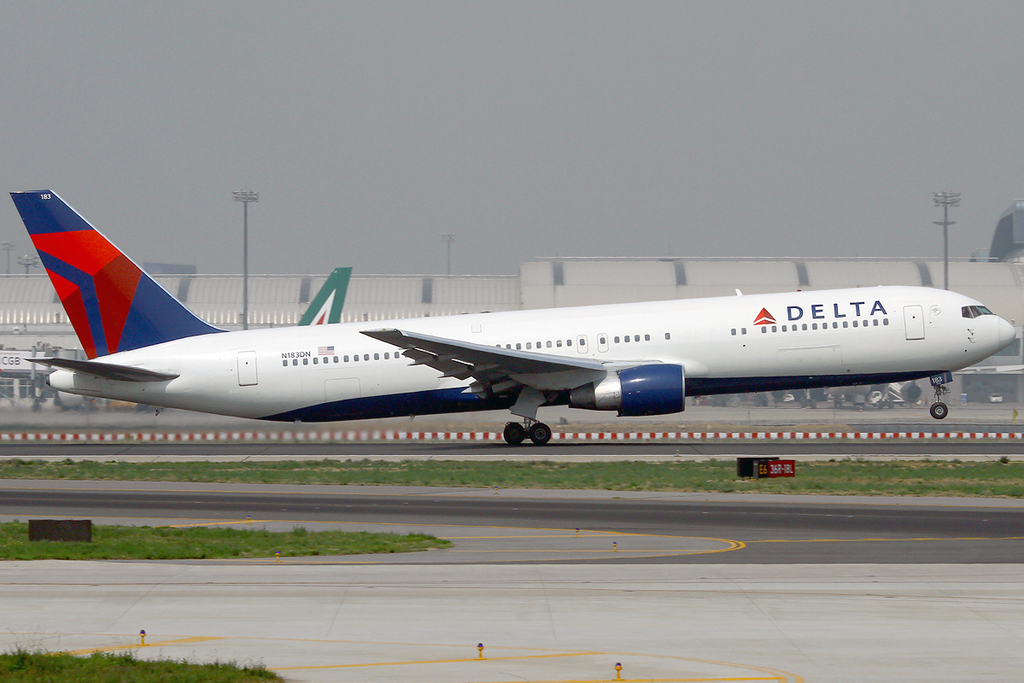Delta Air Lines announces December quarter and full year 2018 profit

Delta Air Lines today reported financial results for the December quarter and full year 2018. Highlights of those results, including both GAAP and adjusted metrics, are below and incorporated here.
Adjusted pre-tax income for the December quarter 2018 was $1.2 billion driven by over $700 million of revenue growth, allowing the company to fully recapture the $508 million increase in adjusted fuel expense and produce an 11 percent adjusted pre-tax margin. Adjusted earnings per share increased by 42 percent year over year to $1.30.
For the full year, adjusted pre-tax income was $5.1 billion, a $137 million decrease relative to 2017 as the company overcame approximately 90 percent of the $2 billion increase in fuel expense. Full year adjusted earnings per share were $5.65, up 19 percent compared to the prior year as the company recognized benefits from tax reform and a four percent lower share count.
“2018 was a successful year for Delta with record operational reliability, increasing customer satisfaction, and solid financial results in the face of higher fuel costs. Delta people are the foundation of our success and I am honored to recognize their efforts with $1.3 billion in profit sharing for 2018,” said Ed Bastian, Delta’s chief executive officer. “As we move into 2019, we expect to drive double-digit earnings growth through higher revenues, maintaining a cost trajectory below inflation, and the modest benefit from lower fuel costs. Margin expansion is a business imperative and we remain confident in our full-year earnings guidance of $6 to $7 per share.”
Revenue Environment
Delta’s adjusted operating revenue of $10.7 billion for the December quarter improved 7.5 percent, or $747 million versus the prior year. Total unit revenues excluding refinery sales (TRASM, adjusted) increased 3.2 percent during the period driven by healthy leisure and corporate demand offsetting an approximately 0.5 point headwind from unfavorable foreign exchange rates.
For the full year, adjusted operating revenue grew to nearly $44 billion, up eight percent versus prior year on an increasingly diverse revenue base, with 52 percent of revenues from premium products and non-ticket sources. Premium product ticket revenues increased 14 percent along with double-digit percentage increases from cargo, loyalty, and Maintenance, Repair and Overhaul revenue.
“Delta's strong brand momentum was evident across the business with positive unit revenue growth in all geographic entities for the full year, a record revenue premium to the industry, and double-digit revenue growth from premium products and non-ticket sources,” said Glen Hauenstein, Delta’s president. “Our March quarter adjusted unit revenue growth is expected to be flat to up two percent including impacts from the timing of Easter, increasing currency headwinds, and the ongoing government shutdown.”Chart 1
March Quarter 2019 Guidance
For the March quarter, Delta expects to deliver four to six percent total adjusted revenue growth and non-fuel unit cost growth below inflation.
Cost Performance
Total adjusted operating expenses for the December quarter increased $803 million versus the prior year quarter, with more than half of the increase driven by higher fuel prices and profit sharing.
CASM-Ex was down 0.5 percent for the December quarter 2018 compared to the prior year period, the strongest cost performance for the year. For the full year, CASM-Ex increased 1.4 percent, marking an important inflection in the company's cost trajectory with increasing benefits from efficiency initiatives, Delta's fleet transformation and strong performance from operating units.
Adjusted fuel expense increased $508 million, or 27 percent, relative to December quarter 2017. Delta’s adjusted fuel price per gallon for the December quarter was $2.42 which includes a 16 cent headwind from the Monroe refinery and inventory pre-purchases. For the full year, adjusted fuel expense increased $2.1 billion, or 29 percent versus prior year.
Adjusted non-operating expense for the quarter improved by $258 million versus the prior year, driven primarily by pension expense favorability and the DAL Global Services transaction (see below for more detail). For the full year, adjusted non-operating expense improved by $360 million versus the prior year.
“In 2018, we successfully returned to our long-term target of keeping non-fuel unit cost growth below two percent, with December quarter non-fuel unit costs declining 0.5 percent,” said Paul Jacobson, Delta’s chief financial officer. “With solid momentum from our fleet transformation and One Delta efforts, we have confidence in our path to one percent non-fuel unit cost growth in 2019.”
Cash Flow and Shareholder Returns
Delta generated $1.3 billion of adjusted operating cash flow and $45 million of free cash flow during the quarter. For the full year, Delta generated $6.9 billion of adjusted operating cash flow and $2.3 billion of free cash flow.
The company invested $4.7 billion into the business in 2018 including $1.3 billion in the December quarter. This enabled delivery of 68 new aircraft in 2018, including five Airbus A350s and four Airbus A220s. The company's ongoing fleet transformation is driving higher customer satisfaction, premium seat growth, and improved cost efficiency.
During the December quarter, Delta returned $563 million to shareholders, comprised of $325 million of share repurchases and $238 million in dividends. For the full year, Delta returned $2.5 billion to shareholders, comprised of $1.6 billion of share repurchases and $909 million in dividends.
Strategic Highlights
In 2018, Delta achieved a number of milestones across its five key strategic pillars.
Culture and People
• Received the Glassdoor Employee’s Choice Award for the fourth consecutive year, based entirely on input provided by employees, reiterating the importance of the Delta culture.
• Announced sustainability improvements including removal of a variety of single-use plastic items from Delta’s aircraft and clubs, eliminating more than 300,000 pounds in plastic waste annually.
• Contributed over $50 million to the communities we serve as part of Delta's commitment to give back at least 1% of net profits to charitable organizations.
Operational Reliability
• Delivered 143 days of zero system cancellations across the combined mainline and Delta Connection operations on a full year basis, up from 90 days in 2017.
• Achieved industry-leading operational performance with mainline on-time performance (A14) of 85.7 percent for the year; and top legacy carrier baggage performance as measured in the latest Department of Transportation report.
• Recognized by FlightGlobal as the ‘Most On-time North American Mainline Airline,’ ‘Most On-time North American Network Airline,’ and ‘Most On-time International Mainline Airline.’
Network and Partnerships
• Continued Delta's global and domestic expansion with the announcement of new routes in the December quarter including Boston-Edinburgh, Boston-Lisbon, Minneapolis/St. Paul-Mexico City, and Minneapolis/St. Paul-Shanghai, pending governmental approvals.
Customer Experience and Loyalty
• Debuted the first U.S. biometric airport terminal at the Maynard H. Jackson International Terminal in Atlanta, allowing customers flying direct to an international destination on Delta, Aeromexico, Air France-KLM, or Virgin Atlantic Airways to use facial recognition technology from curb to gate.
• Ranked as the No. 1 U.S. airline by the corporate travel community in the Business Travel News Airline Survey for a historic eighth consecutive year, sweeping all 10 categories.
• Experienced double-digit growth in co-brand spend, helping drive $3.4 billion of incremental value from Delta’s American Express relationship for the full year. New card acquisitions reached 1 million for the second year in a row and Delta expanded new SkyMiles Members by a record number in one year.
Investment Grade Balance Sheet
• Established a long-term leverage ratio target of 1.5x to 2.5x adjusted debt to EBITDAR, which should allow Delta to maintain investment grade ratings through a business cycle. At year end 2018, Delta achieved a 1.9x adjusted debt to EBITDAR ratio.
DAL Global Services Transaction
On December 21, 2018, Delta completed a transaction combining DAL Global Services (DGS) with a subsidiary of Argenbright Holdings. Delta retained a 49 percent equity stake in the combined company. As a result of the transaction, Delta recognized an approximately $90 million gain in non-operating expense in the December quarter.
For the full year 2018, DGS operations contributed four cents to Delta's earnings per share, after adjusting for profit sharing. In 2019, Delta will recognize 49 percent of the combined entity's income in operating expense. The year over year impact on earnings, margins, and non-fuel unit costs are expected to be immaterial. For guidance purposes, DGS revenues will be excluded in year-over-year calculations for unit and total revenue to reflect core revenue trends in the business. In 2018, DGS contributed approximately $60 million in revenue per quarter.
Lease Accounting
In the December quarter, Delta early adopted the new lease accounting standard. The new standard requires leases to be recorded on the balance sheet as lease liabilities with corresponding right-of-use assets. The effects of the new standard will be reflected as of January 1, 2018 by recasting prior quarters in the company’s 2018 Form 10-K. This adoption resulted in the recognition of approximately $6 billion in incremental lease liabilities and right-of-use assets on the balance sheet.
In addition, the adoption increased full year 2018 pre-tax income by approximately $50 million after adjusting for profit sharing, a six cent impact to full year earnings per share. The impact on the December quarter was immaterial and there is no year over year impact on 2019.
